Issues and Laws in Converting a Sole Trading Business into a Company
VerifiedAdded on 2023/04/03
|9
|2099
|214
AI Summary
This document discusses the issues and laws involved in converting a sole trading business into a company. It explores the steps, advantages, and disadvantages of running a company compared to sole trading. The document also provides insights into a case study on converting a restaurant business into a company. It covers the legal requirements, taxation schemes, control, and paperwork involved.
Contribute Materials
Your contribution can guide someone’s learning journey. Share your
documents today.
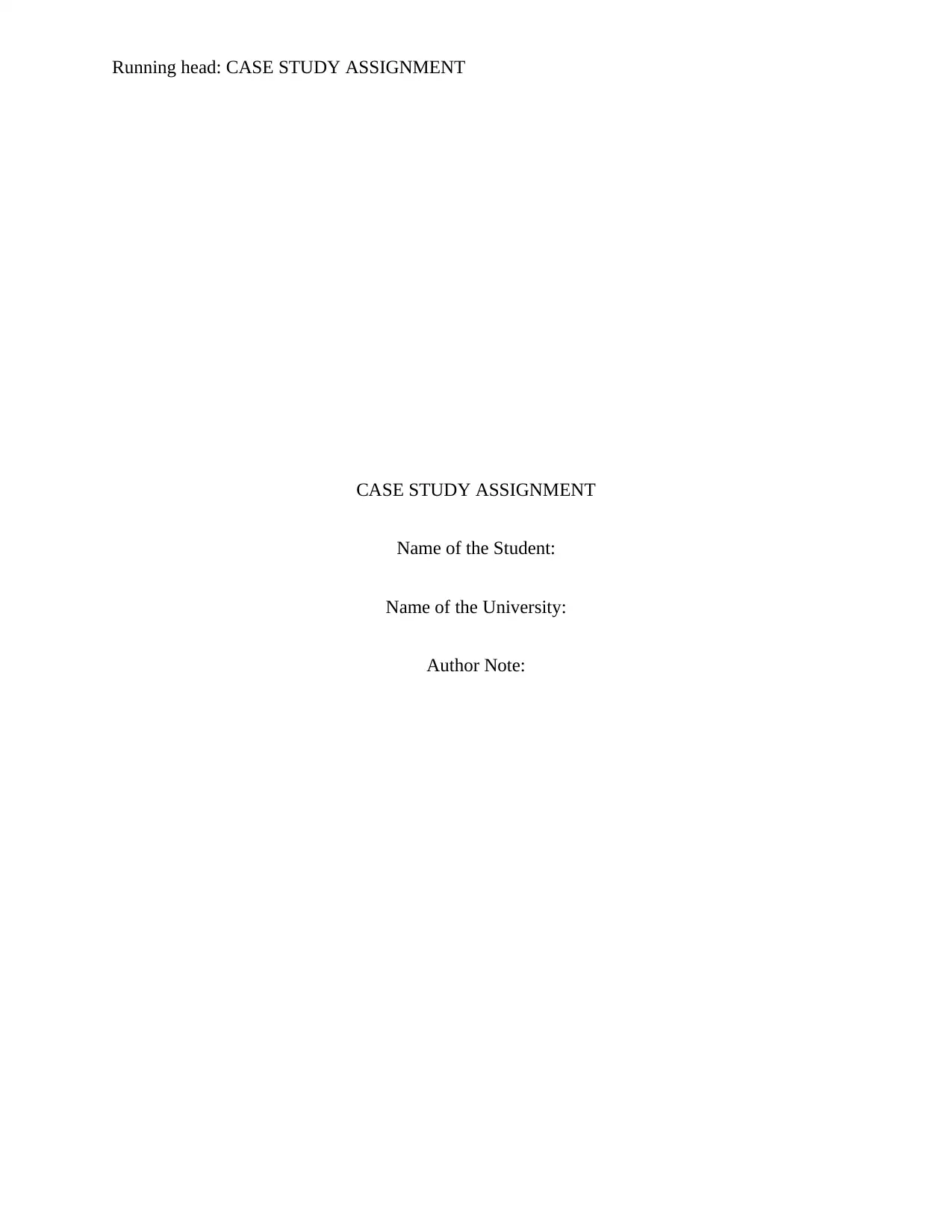
Running head: CASE STUDY ASSIGNMENT
CASE STUDY ASSIGNMENT
Name of the Student:
Name of the University:
Author Note:
CASE STUDY ASSIGNMENT
Name of the Student:
Name of the University:
Author Note:
Secure Best Marks with AI Grader
Need help grading? Try our AI Grader for instant feedback on your assignments.
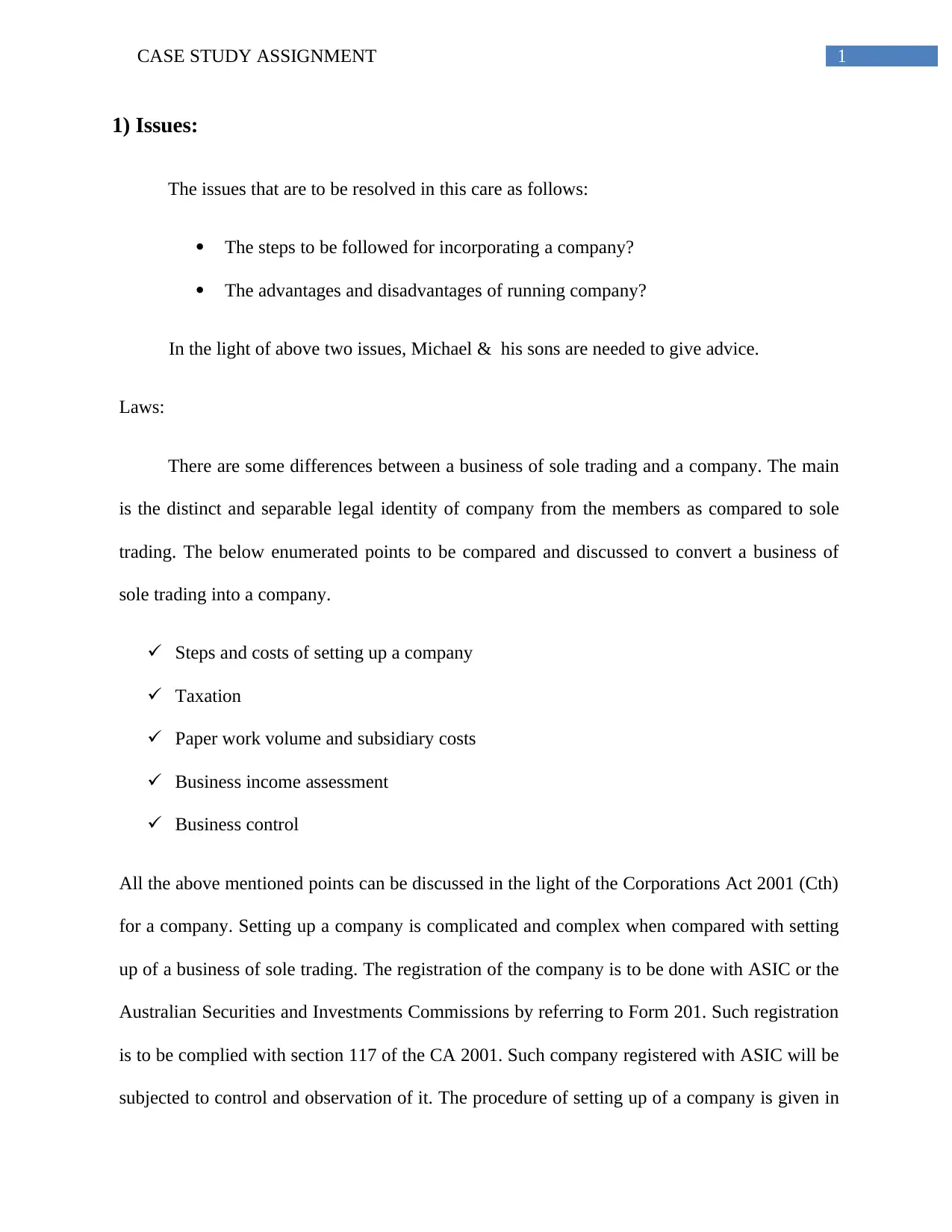
1CASE STUDY ASSIGNMENT
1) Issues:
The issues that are to be resolved in this care as follows:
The steps to be followed for incorporating a company?
The advantages and disadvantages of running company?
In the light of above two issues, Michael & his sons are needed to give advice.
Laws:
There are some differences between a business of sole trading and a company. The main
is the distinct and separable legal identity of company from the members as compared to sole
trading. The below enumerated points to be compared and discussed to convert a business of
sole trading into a company.
Steps and costs of setting up a company
Taxation
Paper work volume and subsidiary costs
Business income assessment
Business control
All the above mentioned points can be discussed in the light of the Corporations Act 2001 (Cth)
for a company. Setting up a company is complicated and complex when compared with setting
up of a business of sole trading. The registration of the company is to be done with ASIC or the
Australian Securities and Investments Commissions by referring to Form 201. Such registration
is to be complied with section 117 of the CA 2001. Such company registered with ASIC will be
subjected to control and observation of it. The procedure of setting up of a company is given in
1) Issues:
The issues that are to be resolved in this care as follows:
The steps to be followed for incorporating a company?
The advantages and disadvantages of running company?
In the light of above two issues, Michael & his sons are needed to give advice.
Laws:
There are some differences between a business of sole trading and a company. The main
is the distinct and separable legal identity of company from the members as compared to sole
trading. The below enumerated points to be compared and discussed to convert a business of
sole trading into a company.
Steps and costs of setting up a company
Taxation
Paper work volume and subsidiary costs
Business income assessment
Business control
All the above mentioned points can be discussed in the light of the Corporations Act 2001 (Cth)
for a company. Setting up a company is complicated and complex when compared with setting
up of a business of sole trading. The registration of the company is to be done with ASIC or the
Australian Securities and Investments Commissions by referring to Form 201. Such registration
is to be complied with section 117 of the CA 2001. Such company registered with ASIC will be
subjected to control and observation of it. The procedure of setting up of a company is given in
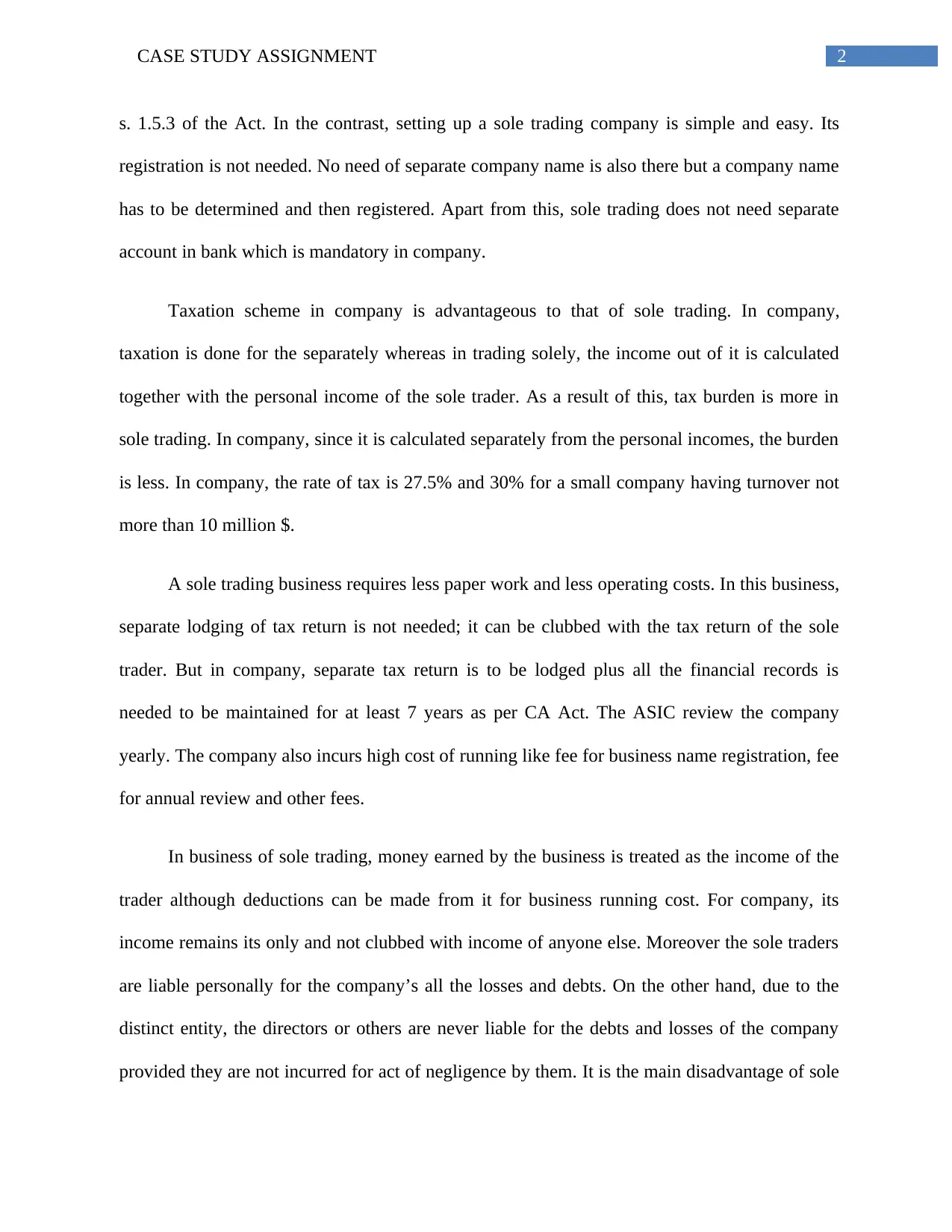
2CASE STUDY ASSIGNMENT
s. 1.5.3 of the Act. In the contrast, setting up a sole trading company is simple and easy. Its
registration is not needed. No need of separate company name is also there but a company name
has to be determined and then registered. Apart from this, sole trading does not need separate
account in bank which is mandatory in company.
Taxation scheme in company is advantageous to that of sole trading. In company,
taxation is done for the separately whereas in trading solely, the income out of it is calculated
together with the personal income of the sole trader. As a result of this, tax burden is more in
sole trading. In company, since it is calculated separately from the personal incomes, the burden
is less. In company, the rate of tax is 27.5% and 30% for a small company having turnover not
more than 10 million $.
A sole trading business requires less paper work and less operating costs. In this business,
separate lodging of tax return is not needed; it can be clubbed with the tax return of the sole
trader. But in company, separate tax return is to be lodged plus all the financial records is
needed to be maintained for at least 7 years as per CA Act. The ASIC review the company
yearly. The company also incurs high cost of running like fee for business name registration, fee
for annual review and other fees.
In business of sole trading, money earned by the business is treated as the income of the
trader although deductions can be made from it for business running cost. For company, its
income remains its only and not clubbed with income of anyone else. Moreover the sole traders
are liable personally for the company’s all the losses and debts. On the other hand, due to the
distinct entity, the directors or others are never liable for the debts and losses of the company
provided they are not incurred for act of negligence by them. It is the main disadvantage of sole
s. 1.5.3 of the Act. In the contrast, setting up a sole trading company is simple and easy. Its
registration is not needed. No need of separate company name is also there but a company name
has to be determined and then registered. Apart from this, sole trading does not need separate
account in bank which is mandatory in company.
Taxation scheme in company is advantageous to that of sole trading. In company,
taxation is done for the separately whereas in trading solely, the income out of it is calculated
together with the personal income of the sole trader. As a result of this, tax burden is more in
sole trading. In company, since it is calculated separately from the personal incomes, the burden
is less. In company, the rate of tax is 27.5% and 30% for a small company having turnover not
more than 10 million $.
A sole trading business requires less paper work and less operating costs. In this business,
separate lodging of tax return is not needed; it can be clubbed with the tax return of the sole
trader. But in company, separate tax return is to be lodged plus all the financial records is
needed to be maintained for at least 7 years as per CA Act. The ASIC review the company
yearly. The company also incurs high cost of running like fee for business name registration, fee
for annual review and other fees.
In business of sole trading, money earned by the business is treated as the income of the
trader although deductions can be made from it for business running cost. For company, its
income remains its only and not clubbed with income of anyone else. Moreover the sole traders
are liable personally for the company’s all the losses and debts. On the other hand, due to the
distinct entity, the directors or others are never liable for the debts and losses of the company
provided they are not incurred for act of negligence by them. It is the main disadvantage of sole
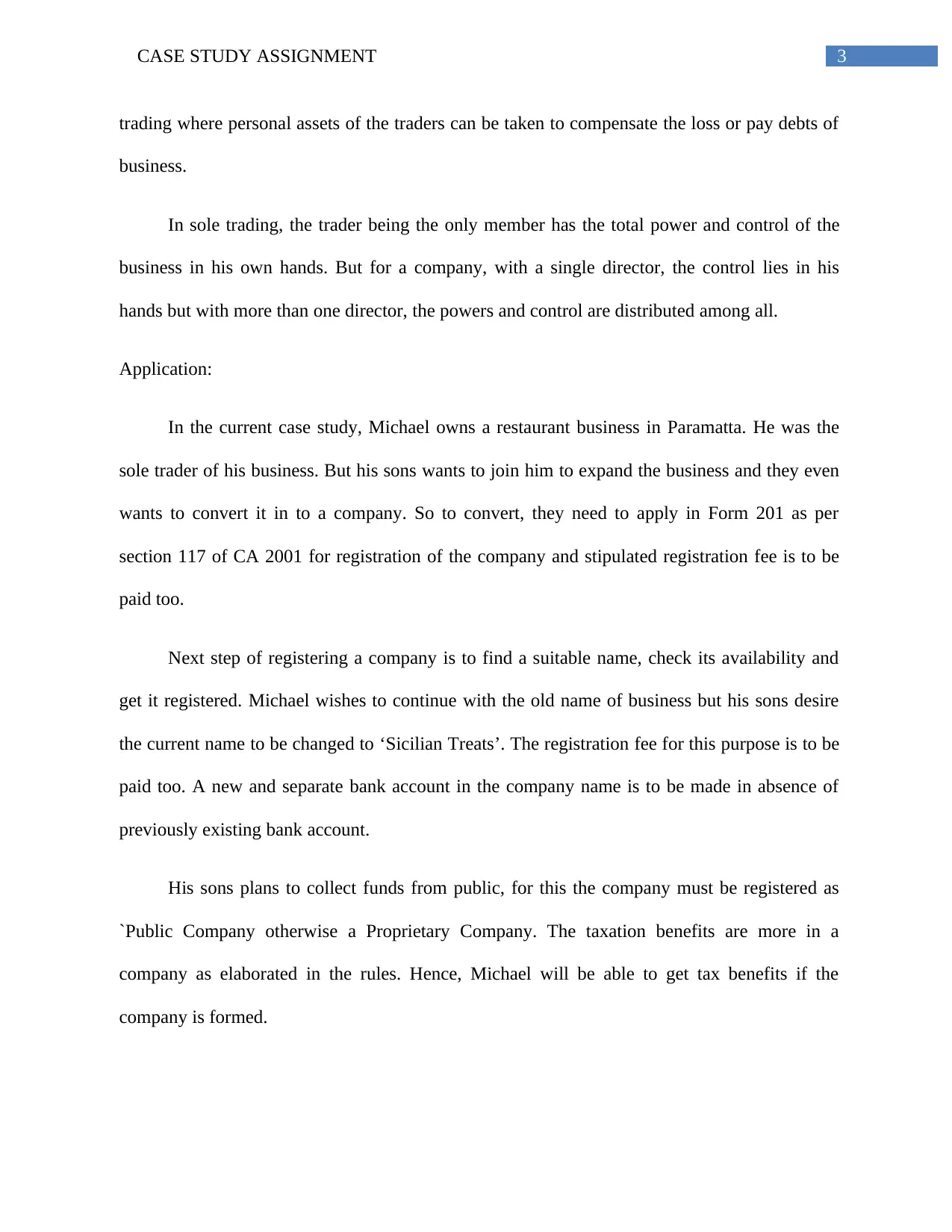
3CASE STUDY ASSIGNMENT
trading where personal assets of the traders can be taken to compensate the loss or pay debts of
business.
In sole trading, the trader being the only member has the total power and control of the
business in his own hands. But for a company, with a single director, the control lies in his
hands but with more than one director, the powers and control are distributed among all.
Application:
In the current case study, Michael owns a restaurant business in Paramatta. He was the
sole trader of his business. But his sons wants to join him to expand the business and they even
wants to convert it in to a company. So to convert, they need to apply in Form 201 as per
section 117 of CA 2001 for registration of the company and stipulated registration fee is to be
paid too.
Next step of registering a company is to find a suitable name, check its availability and
get it registered. Michael wishes to continue with the old name of business but his sons desire
the current name to be changed to ‘Sicilian Treats’. The registration fee for this purpose is to be
paid too. A new and separate bank account in the company name is to be made in absence of
previously existing bank account.
His sons plans to collect funds from public, for this the company must be registered as
`Public Company otherwise a Proprietary Company. The taxation benefits are more in a
company as elaborated in the rules. Hence, Michael will be able to get tax benefits if the
company is formed.
trading where personal assets of the traders can be taken to compensate the loss or pay debts of
business.
In sole trading, the trader being the only member has the total power and control of the
business in his own hands. But for a company, with a single director, the control lies in his
hands but with more than one director, the powers and control are distributed among all.
Application:
In the current case study, Michael owns a restaurant business in Paramatta. He was the
sole trader of his business. But his sons wants to join him to expand the business and they even
wants to convert it in to a company. So to convert, they need to apply in Form 201 as per
section 117 of CA 2001 for registration of the company and stipulated registration fee is to be
paid too.
Next step of registering a company is to find a suitable name, check its availability and
get it registered. Michael wishes to continue with the old name of business but his sons desire
the current name to be changed to ‘Sicilian Treats’. The registration fee for this purpose is to be
paid too. A new and separate bank account in the company name is to be made in absence of
previously existing bank account.
His sons plans to collect funds from public, for this the company must be registered as
`Public Company otherwise a Proprietary Company. The taxation benefits are more in a
company as elaborated in the rules. Hence, Michael will be able to get tax benefits if the
company is formed.
Secure Best Marks with AI Grader
Need help grading? Try our AI Grader for instant feedback on your assignments.
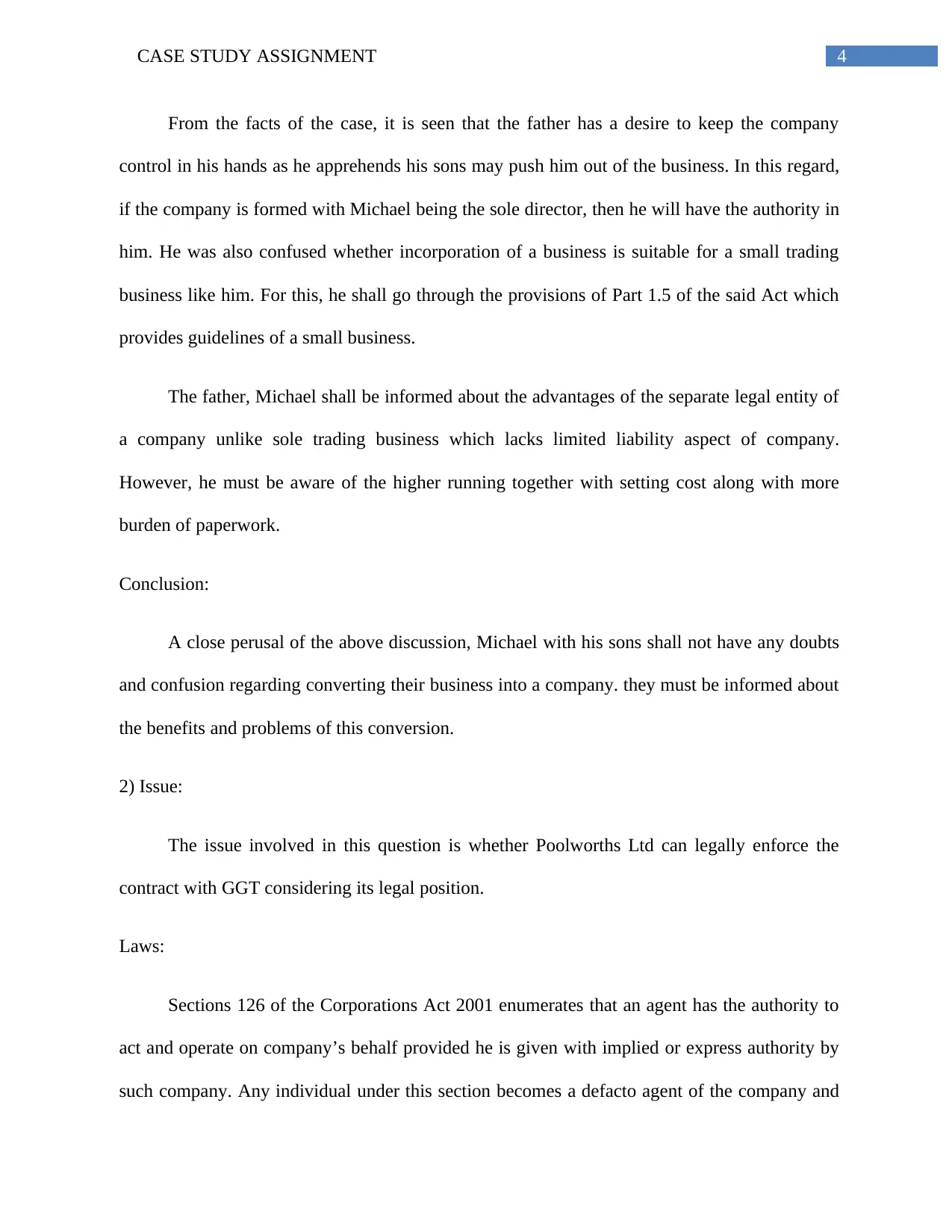
4CASE STUDY ASSIGNMENT
From the facts of the case, it is seen that the father has a desire to keep the company
control in his hands as he apprehends his sons may push him out of the business. In this regard,
if the company is formed with Michael being the sole director, then he will have the authority in
him. He was also confused whether incorporation of a business is suitable for a small trading
business like him. For this, he shall go through the provisions of Part 1.5 of the said Act which
provides guidelines of a small business.
The father, Michael shall be informed about the advantages of the separate legal entity of
a company unlike sole trading business which lacks limited liability aspect of company.
However, he must be aware of the higher running together with setting cost along with more
burden of paperwork.
Conclusion:
A close perusal of the above discussion, Michael with his sons shall not have any doubts
and confusion regarding converting their business into a company. they must be informed about
the benefits and problems of this conversion.
2) Issue:
The issue involved in this question is whether Poolworths Ltd can legally enforce the
contract with GGT considering its legal position.
Laws:
Sections 126 of the Corporations Act 2001 enumerates that an agent has the authority to
act and operate on company’s behalf provided he is given with implied or express authority by
such company. Any individual under this section becomes a defacto agent of the company and
From the facts of the case, it is seen that the father has a desire to keep the company
control in his hands as he apprehends his sons may push him out of the business. In this regard,
if the company is formed with Michael being the sole director, then he will have the authority in
him. He was also confused whether incorporation of a business is suitable for a small trading
business like him. For this, he shall go through the provisions of Part 1.5 of the said Act which
provides guidelines of a small business.
The father, Michael shall be informed about the advantages of the separate legal entity of
a company unlike sole trading business which lacks limited liability aspect of company.
However, he must be aware of the higher running together with setting cost along with more
burden of paperwork.
Conclusion:
A close perusal of the above discussion, Michael with his sons shall not have any doubts
and confusion regarding converting their business into a company. they must be informed about
the benefits and problems of this conversion.
2) Issue:
The issue involved in this question is whether Poolworths Ltd can legally enforce the
contract with GGT considering its legal position.
Laws:
Sections 126 of the Corporations Act 2001 enumerates that an agent has the authority to
act and operate on company’s behalf provided he is given with implied or express authority by
such company. Any individual under this section becomes a defacto agent of the company and
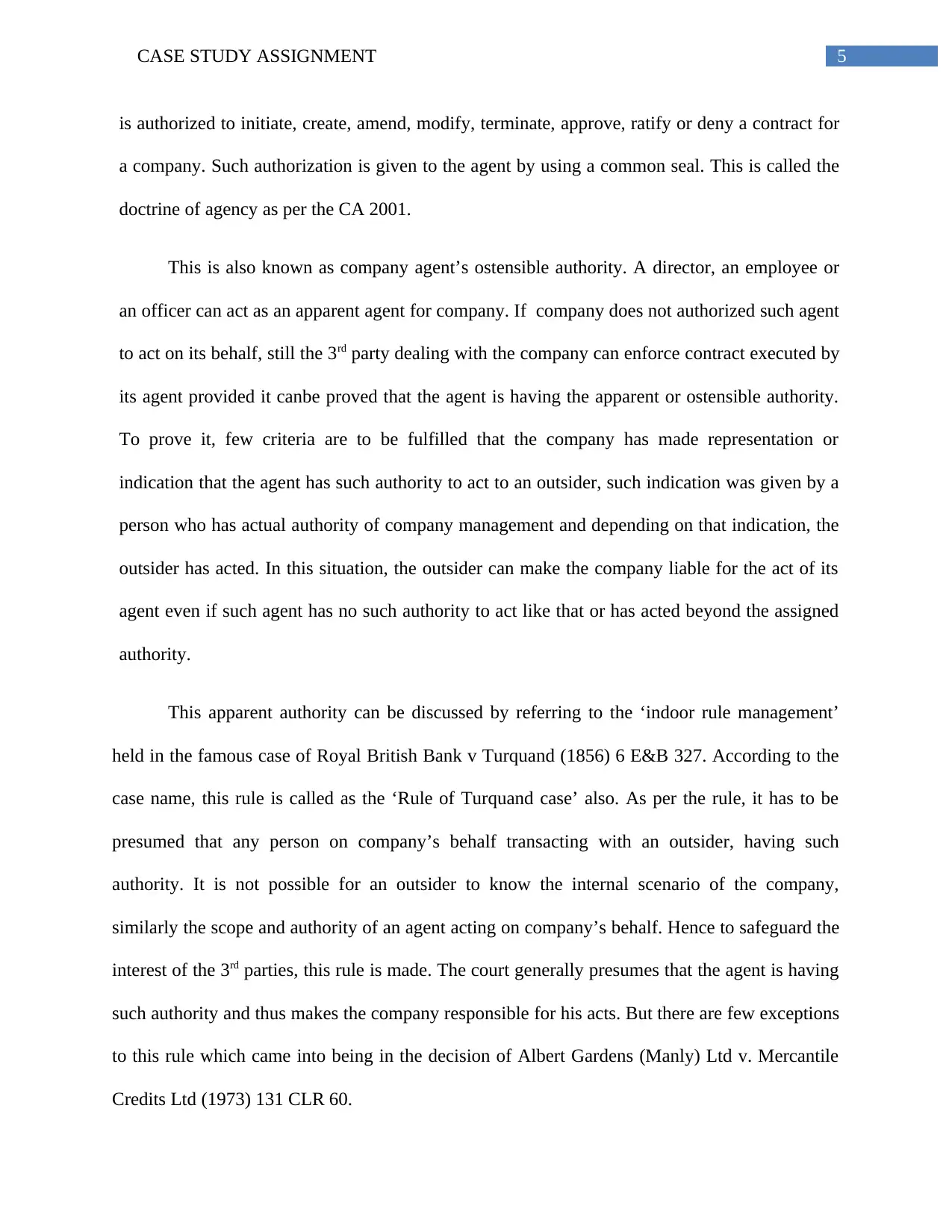
5CASE STUDY ASSIGNMENT
is authorized to initiate, create, amend, modify, terminate, approve, ratify or deny a contract for
a company. Such authorization is given to the agent by using a common seal. This is called the
doctrine of agency as per the CA 2001.
This is also known as company agent’s ostensible authority. A director, an employee or
an officer can act as an apparent agent for company. If company does not authorized such agent
to act on its behalf, still the 3rd party dealing with the company can enforce contract executed by
its agent provided it canbe proved that the agent is having the apparent or ostensible authority.
To prove it, few criteria are to be fulfilled that the company has made representation or
indication that the agent has such authority to act to an outsider, such indication was given by a
person who has actual authority of company management and depending on that indication, the
outsider has acted. In this situation, the outsider can make the company liable for the act of its
agent even if such agent has no such authority to act like that or has acted beyond the assigned
authority.
This apparent authority can be discussed by referring to the ‘indoor rule management’
held in the famous case of Royal British Bank v Turquand (1856) 6 E&B 327. According to the
case name, this rule is called as the ‘Rule of Turquand case’ also. As per the rule, it has to be
presumed that any person on company’s behalf transacting with an outsider, having such
authority. It is not possible for an outsider to know the internal scenario of the company,
similarly the scope and authority of an agent acting on company’s behalf. Hence to safeguard the
interest of the 3rd parties, this rule is made. The court generally presumes that the agent is having
such authority and thus makes the company responsible for his acts. But there are few exceptions
to this rule which came into being in the decision of Albert Gardens (Manly) Ltd v. Mercantile
Credits Ltd (1973) 131 CLR 60.
is authorized to initiate, create, amend, modify, terminate, approve, ratify or deny a contract for
a company. Such authorization is given to the agent by using a common seal. This is called the
doctrine of agency as per the CA 2001.
This is also known as company agent’s ostensible authority. A director, an employee or
an officer can act as an apparent agent for company. If company does not authorized such agent
to act on its behalf, still the 3rd party dealing with the company can enforce contract executed by
its agent provided it canbe proved that the agent is having the apparent or ostensible authority.
To prove it, few criteria are to be fulfilled that the company has made representation or
indication that the agent has such authority to act to an outsider, such indication was given by a
person who has actual authority of company management and depending on that indication, the
outsider has acted. In this situation, the outsider can make the company liable for the act of its
agent even if such agent has no such authority to act like that or has acted beyond the assigned
authority.
This apparent authority can be discussed by referring to the ‘indoor rule management’
held in the famous case of Royal British Bank v Turquand (1856) 6 E&B 327. According to the
case name, this rule is called as the ‘Rule of Turquand case’ also. As per the rule, it has to be
presumed that any person on company’s behalf transacting with an outsider, having such
authority. It is not possible for an outsider to know the internal scenario of the company,
similarly the scope and authority of an agent acting on company’s behalf. Hence to safeguard the
interest of the 3rd parties, this rule is made. The court generally presumes that the agent is having
such authority and thus makes the company responsible for his acts. But there are few exceptions
to this rule which came into being in the decision of Albert Gardens (Manly) Ltd v. Mercantile
Credits Ltd (1973) 131 CLR 60.
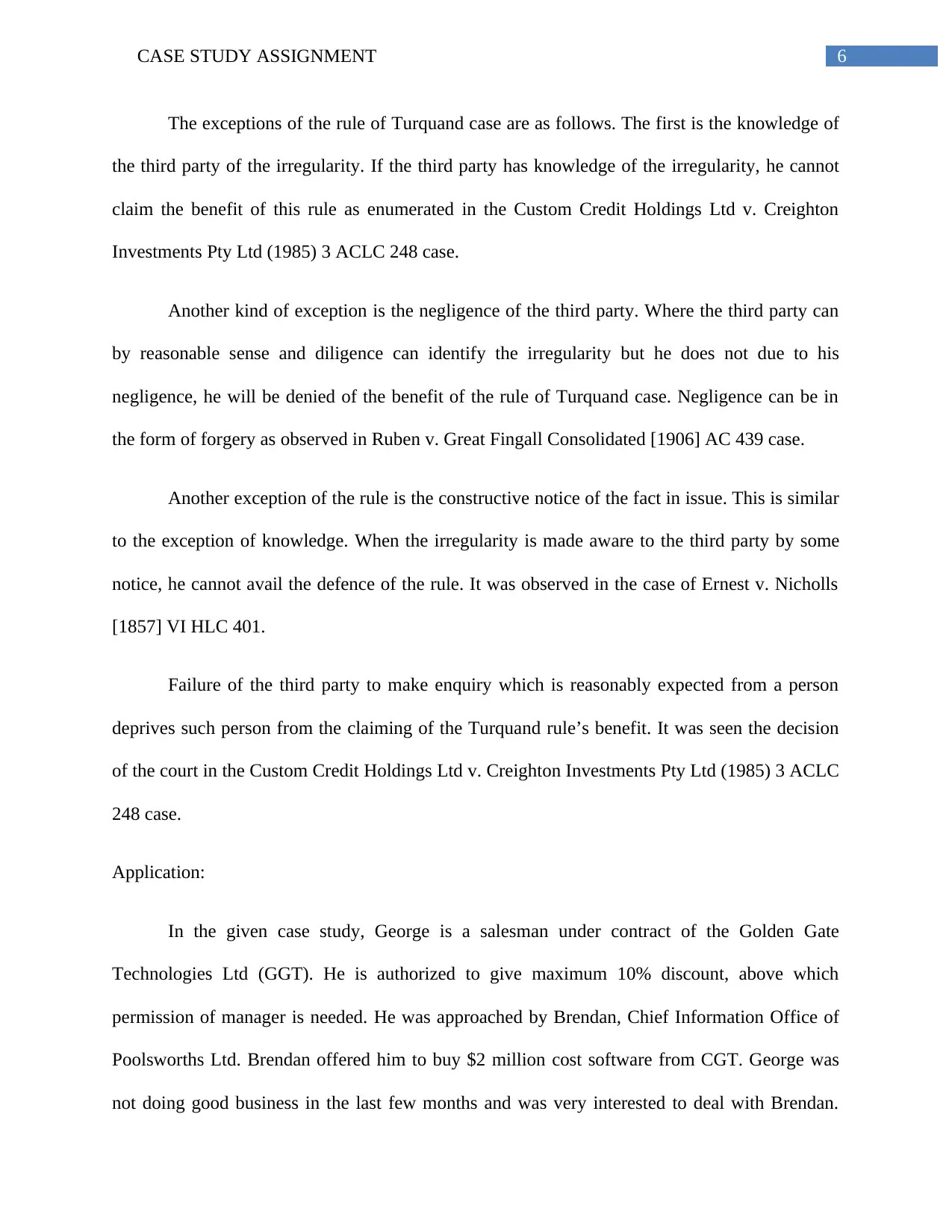
6CASE STUDY ASSIGNMENT
The exceptions of the rule of Turquand case are as follows. The first is the knowledge of
the third party of the irregularity. If the third party has knowledge of the irregularity, he cannot
claim the benefit of this rule as enumerated in the Custom Credit Holdings Ltd v. Creighton
Investments Pty Ltd (1985) 3 ACLC 248 case.
Another kind of exception is the negligence of the third party. Where the third party can
by reasonable sense and diligence can identify the irregularity but he does not due to his
negligence, he will be denied of the benefit of the rule of Turquand case. Negligence can be in
the form of forgery as observed in Ruben v. Great Fingall Consolidated [1906] AC 439 case.
Another exception of the rule is the constructive notice of the fact in issue. This is similar
to the exception of knowledge. When the irregularity is made aware to the third party by some
notice, he cannot avail the defence of the rule. It was observed in the case of Ernest v. Nicholls
[1857] VI HLC 401.
Failure of the third party to make enquiry which is reasonably expected from a person
deprives such person from the claiming of the Turquand rule’s benefit. It was seen the decision
of the court in the Custom Credit Holdings Ltd v. Creighton Investments Pty Ltd (1985) 3 ACLC
248 case.
Application:
In the given case study, George is a salesman under contract of the Golden Gate
Technologies Ltd (GGT). He is authorized to give maximum 10% discount, above which
permission of manager is needed. He was approached by Brendan, Chief Information Office of
Poolsworths Ltd. Brendan offered him to buy $2 million cost software from CGT. George was
not doing good business in the last few months and was very interested to deal with Brendan.
The exceptions of the rule of Turquand case are as follows. The first is the knowledge of
the third party of the irregularity. If the third party has knowledge of the irregularity, he cannot
claim the benefit of this rule as enumerated in the Custom Credit Holdings Ltd v. Creighton
Investments Pty Ltd (1985) 3 ACLC 248 case.
Another kind of exception is the negligence of the third party. Where the third party can
by reasonable sense and diligence can identify the irregularity but he does not due to his
negligence, he will be denied of the benefit of the rule of Turquand case. Negligence can be in
the form of forgery as observed in Ruben v. Great Fingall Consolidated [1906] AC 439 case.
Another exception of the rule is the constructive notice of the fact in issue. This is similar
to the exception of knowledge. When the irregularity is made aware to the third party by some
notice, he cannot avail the defence of the rule. It was observed in the case of Ernest v. Nicholls
[1857] VI HLC 401.
Failure of the third party to make enquiry which is reasonably expected from a person
deprives such person from the claiming of the Turquand rule’s benefit. It was seen the decision
of the court in the Custom Credit Holdings Ltd v. Creighton Investments Pty Ltd (1985) 3 ACLC
248 case.
Application:
In the given case study, George is a salesman under contract of the Golden Gate
Technologies Ltd (GGT). He is authorized to give maximum 10% discount, above which
permission of manager is needed. He was approached by Brendan, Chief Information Office of
Poolsworths Ltd. Brendan offered him to buy $2 million cost software from CGT. George was
not doing good business in the last few months and was very interested to deal with Brendan.
Paraphrase This Document
Need a fresh take? Get an instant paraphrase of this document with our AI Paraphraser
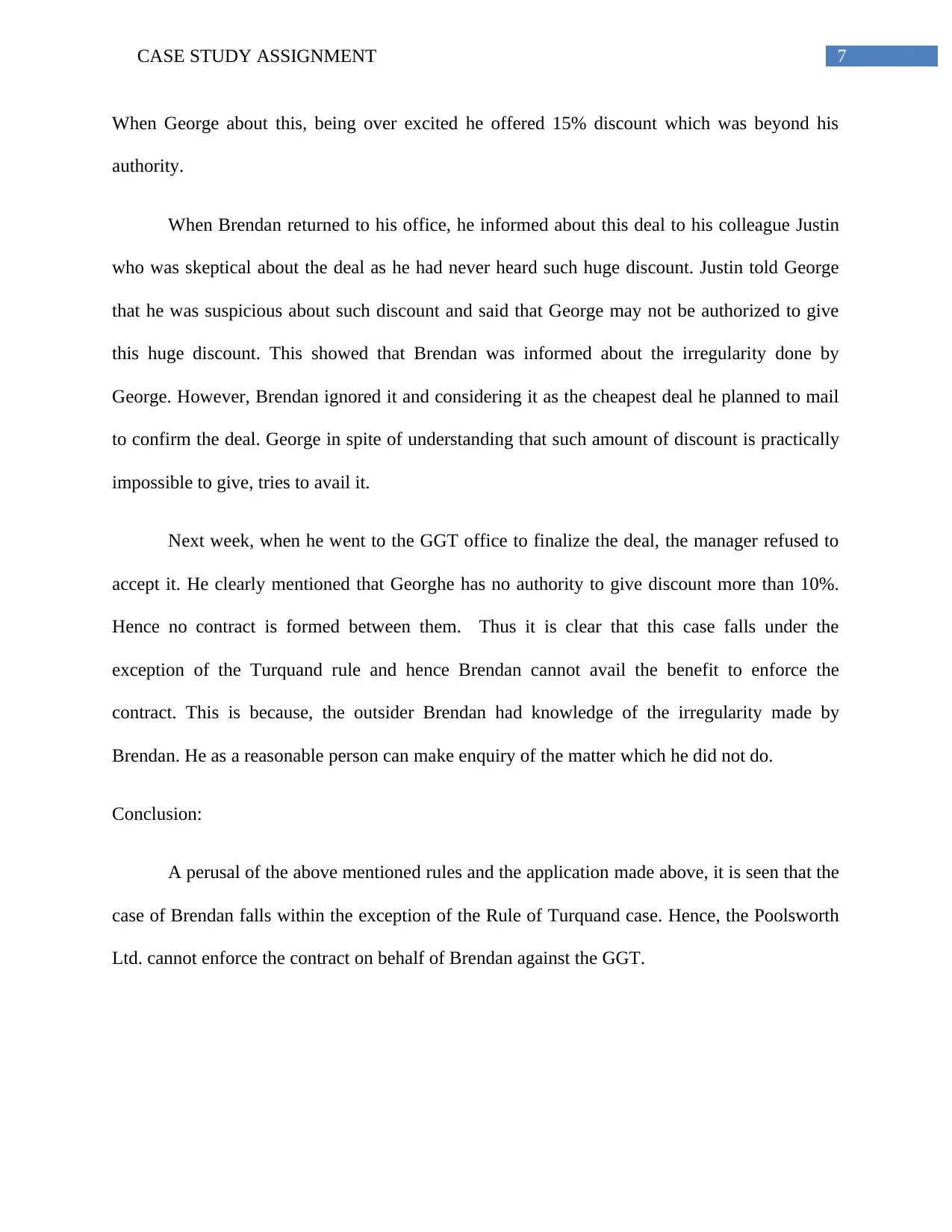
7CASE STUDY ASSIGNMENT
When George about this, being over excited he offered 15% discount which was beyond his
authority.
When Brendan returned to his office, he informed about this deal to his colleague Justin
who was skeptical about the deal as he had never heard such huge discount. Justin told George
that he was suspicious about such discount and said that George may not be authorized to give
this huge discount. This showed that Brendan was informed about the irregularity done by
George. However, Brendan ignored it and considering it as the cheapest deal he planned to mail
to confirm the deal. George in spite of understanding that such amount of discount is practically
impossible to give, tries to avail it.
Next week, when he went to the GGT office to finalize the deal, the manager refused to
accept it. He clearly mentioned that Georghe has no authority to give discount more than 10%.
Hence no contract is formed between them. Thus it is clear that this case falls under the
exception of the Turquand rule and hence Brendan cannot avail the benefit to enforce the
contract. This is because, the outsider Brendan had knowledge of the irregularity made by
Brendan. He as a reasonable person can make enquiry of the matter which he did not do.
Conclusion:
A perusal of the above mentioned rules and the application made above, it is seen that the
case of Brendan falls within the exception of the Rule of Turquand case. Hence, the Poolsworth
Ltd. cannot enforce the contract on behalf of Brendan against the GGT.
When George about this, being over excited he offered 15% discount which was beyond his
authority.
When Brendan returned to his office, he informed about this deal to his colleague Justin
who was skeptical about the deal as he had never heard such huge discount. Justin told George
that he was suspicious about such discount and said that George may not be authorized to give
this huge discount. This showed that Brendan was informed about the irregularity done by
George. However, Brendan ignored it and considering it as the cheapest deal he planned to mail
to confirm the deal. George in spite of understanding that such amount of discount is practically
impossible to give, tries to avail it.
Next week, when he went to the GGT office to finalize the deal, the manager refused to
accept it. He clearly mentioned that Georghe has no authority to give discount more than 10%.
Hence no contract is formed between them. Thus it is clear that this case falls under the
exception of the Turquand rule and hence Brendan cannot avail the benefit to enforce the
contract. This is because, the outsider Brendan had knowledge of the irregularity made by
Brendan. He as a reasonable person can make enquiry of the matter which he did not do.
Conclusion:
A perusal of the above mentioned rules and the application made above, it is seen that the
case of Brendan falls within the exception of the Rule of Turquand case. Hence, the Poolsworth
Ltd. cannot enforce the contract on behalf of Brendan against the GGT.
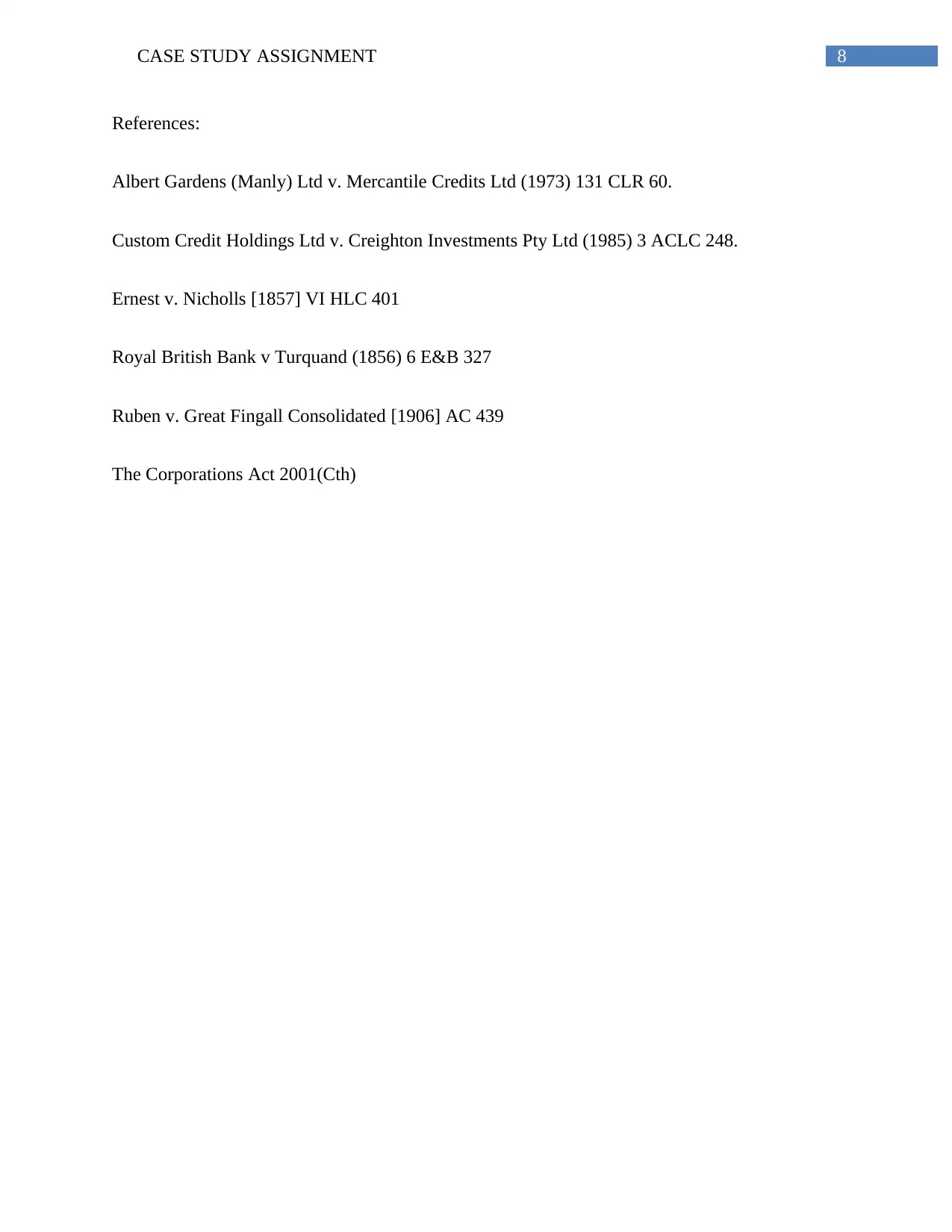
8CASE STUDY ASSIGNMENT
References:
Albert Gardens (Manly) Ltd v. Mercantile Credits Ltd (1973) 131 CLR 60.
Custom Credit Holdings Ltd v. Creighton Investments Pty Ltd (1985) 3 ACLC 248.
Ernest v. Nicholls [1857] VI HLC 401
Royal British Bank v Turquand (1856) 6 E&B 327
Ruben v. Great Fingall Consolidated [1906] AC 439
The Corporations Act 2001(Cth)
References:
Albert Gardens (Manly) Ltd v. Mercantile Credits Ltd (1973) 131 CLR 60.
Custom Credit Holdings Ltd v. Creighton Investments Pty Ltd (1985) 3 ACLC 248.
Ernest v. Nicholls [1857] VI HLC 401
Royal British Bank v Turquand (1856) 6 E&B 327
Ruben v. Great Fingall Consolidated [1906] AC 439
The Corporations Act 2001(Cth)
1 out of 9
Related Documents
Your All-in-One AI-Powered Toolkit for Academic Success.
+13062052269
info@desklib.com
Available 24*7 on WhatsApp / Email
![[object Object]](/_next/static/media/star-bottom.7253800d.svg)
Unlock your academic potential
© 2024 | Zucol Services PVT LTD | All rights reserved.





